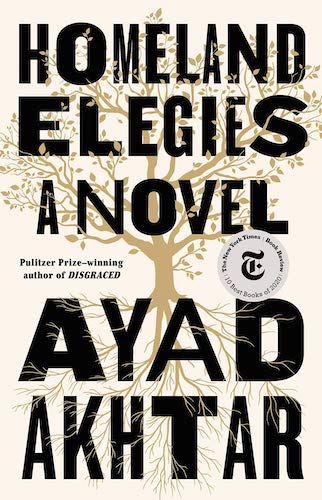Homeland Elegies
Book Author: Ayad Akhtar
Summary reviewed by:
Terrence Timmons
Terrence Timmons
Analyst
Bachelor of Arts (BA), University Of California, Santa Barbara 2019
With over 4 years of experience as an analyst. Terrence Timmons is committed to analyzing summaries without compromising on quality.
Homeland Elegies: Summary
Homeland Elegies grips you from the start, blurring the lines between memoir and fiction as it delves into the heart of the American immigrant experience. Set primarily in the United States, this book is a profound reflection on identity, belonging, and the paradoxes of the American dream. Ayad Akhtar, both the narrator and the author, brings a raw and intimate perspective, drawing from his own life as the son of Pakistani immigrants. The story navigates between the personal and the political, intertwining the narrator’s family history with the broader narrative of America’s complex relationship with Islam and its citizens of Muslim descent post-9/11.
The narrative is a powerful exploration of cultural dislocation and the search for a home in a country that often feels hostile and alien. Through a series of interconnected stories, Akhtar examines the intersections of race, religion, and economics, revealing the deeply entrenched inequalities and prejudices that define contemporary America. From the disillusionment of his father, a successful cardiologist who becomes enamored with Trump’s vision of America, to the narrator’s own struggles with faith, identity, and his place in a country that both fascinates and repels him, Homeland Elegies paints a vivid portrait of a man and a nation in crisis.
Akhtar’s prose is poignant and reflective, pulling the reader into the narrator’s internal struggles and external conflicts. The book’s non-linear structure, shifting between different moments in the narrator’s life, mirrors the fragmented nature of his identity and the fractured reality of the American experience. This is a story of contradictions, where personal ambition collides with cultural heritage, and the pursuit of success often leads to a profound sense of loss.
This novel is not part of a series but stands alone as a powerful, thought-provoking work that challenges readers to confront uncomfortable truths about race, religion, and what it means to be American in the 21st century. If you seek a narrative that explores the complexities of identity and belonging in modern America, Homeland Elegies is a compelling read that will resonate long after you’ve turned the last page.
Spoilers (click here to reveal spoilers)
Homeland Elegies: Genres
Fiction
Literary Fiction
Autobiographical Fiction
Social Commentary
Homeland Elegies: Main Characters
Ayad Akhtar (Narrator): The protagonist and semi-autobiographical version of the author, Ayad is a playwright grappling with his identity as a Pakistani-American Muslim. He is deeply introspective, valuing intellectual honesty and self-exploration. His journey reveals his struggle to reconcile his cultural heritage with his life in America, particularly as he navigates the challenges of racism and belonging.
Ayad’s Father (Dr. Akhtar): A successful cardiologist who embodies the immigrant pursuit of the American dream. He values hard work, success, and the promise of America. His journey reflects his deep disillusionment as he becomes increasingly disenchanted with the political climate in America, especially during the Trump era, ultimately questioning the dream he once believed in so fervently.
Ayad’s Mother: A more reserved figure who values tradition and family stability. She is skeptical of America’s promises and maintains a strong connection to her Pakistani roots, often clashing with her husband’s more optimistic view of their adopted homeland. Her cautious approach highlights the tension between cultural assimilation and the preservation of one’s heritage.
Riaz Rind: A wealthy hedge fund manager and one of Ayad’s acquaintances, Riaz is emblematic of the corrupting influence of capitalism. He values wealth and power, using his financial acumen to exploit the system for personal gain. His interactions with Ayad illustrate the moral compromises and ethical dilemmas that come with extreme success in America.
Homeland Elegies: Themes
Identity and Belonging: The book explores the complex nature of identity for immigrants and their descendants in America. The narrator’s struggle to find a place where he truly belongs underscores the broader theme of what it means to be both American and Muslim in a post-9/11 world.
The American Dream: A central theme is the critique of the American dream, particularly how it promises success and fulfillment but often delivers disappointment and disillusionment. This is evident in Dr. Akhtar’s journey from a believer in the dream to a man questioning its very foundation.
Cultural Dislocation: The feeling of being perpetually out of place, or not fully belonging to either the American or Pakistani culture, is a recurring theme. The narrator’s experiences highlight the emotional and psychological toll of cultural dislocation.
Race and Religion: The book delves into the intersection of race and religion, focusing on how Muslims are perceived and treated in America. The narrator’s experiences and reflections reveal the prejudice and discrimination faced by Muslim Americans, particularly in the context of the war on terror and rising Islamophobia.
Capitalism and Corruption: Through characters like Riaz Rind, the novel critiques the corrupting influence of capitalism, showing how the pursuit of wealth and power can lead to moral decay and ethical compromises.
Homeland Elegies: What You Need to Know
(Contains Spoilers: Perfect for readers seeking a quick review.)
Homeland Elegies unfolds as a meditation on identity, belonging, and the disillusionment of the American dream through the semi-autobiographical experiences of Ayad Akhtar. The narrative begins with Ayad reflecting on his childhood and the influence of his immigrant parents, particularly his father, who had once placed immense faith in the possibilities America offered. As a successful cardiologist, Ayad’s father embodied the immigrant success story, initially thriving in his adopted homeland. However, as the political landscape shifts, particularly with the rise of Donald Trump, his faith in America begins to waver, leading to a deep disillusionment.
The story weaves through various periods of Ayad’s life, from his childhood to his career as a playwright, examining his evolving understanding of what it means to be both American and Muslim. The tension between these identities becomes a central conflict for Ayad, particularly as he witnesses the increasing prejudice against Muslims in the post-9/11 era. His mother remains skeptical of America’s promises, maintaining a strong connection to her Pakistani roots, while his father’s eventual disillusionment mirrors Ayad’s own struggles.
Ayad’s interactions with various characters, including Riaz Rind, a wealthy hedge fund manager, expose the darker sides of capitalism and the moral compromises that often accompany the pursuit of wealth in America. Riaz represents the epitome of financial success but also serves as a cautionary figure, illustrating the ethical decay that can result from prioritizing wealth and power above all else.
As Ayad grapples with his identity, he is also forced to confront the limitations of the American dream. The novel’s non-linear structure reflects the fragmented nature of his identity and the complex reality of being an immigrant in America. Ayad’s father’s journey from optimism to disenchantment serves as a poignant commentary on the broader immigrant experience, highlighting the emotional toll of living in a country that often fails to live up to its promises.
In the end, the novel does not provide easy answers but instead leaves readers with a deep sense of the unresolved tensions and contradictions that define the immigrant experience in America. Ayad comes to accept that his quest for a unified identity—a sense of true belonging—is an ongoing, perhaps unattainable, journey. The story closes with a reflection on the transient nature of belonging, suggesting that the idea of a homeland may be more of an illusion than a reality.
Homeland Elegies: Methodology
In creating this summary, we focused on Expert Analysis by meticulously examining the intricate layers of Homeland Elegies, extracting its core themes of identity, belonging, and the disillusionment with the American dream. We also prioritized Quality and Integrity, ensuring the summary remained true to Ayad Akhtar’s tone and intent. Synthesizing Content was essential as we distilled the narrative’s essence, capturing the emotional and intellectual conflicts that define the immigrant experience, without sacrificing the depth and complexity of the original work. Our approach ensures that each reader gains a comprehensive understanding of the book's key messages and themes.


Homeland Elegies
Date Published:
Disclaimer: As an Amazon Associate I earn from qualifying purchases.




